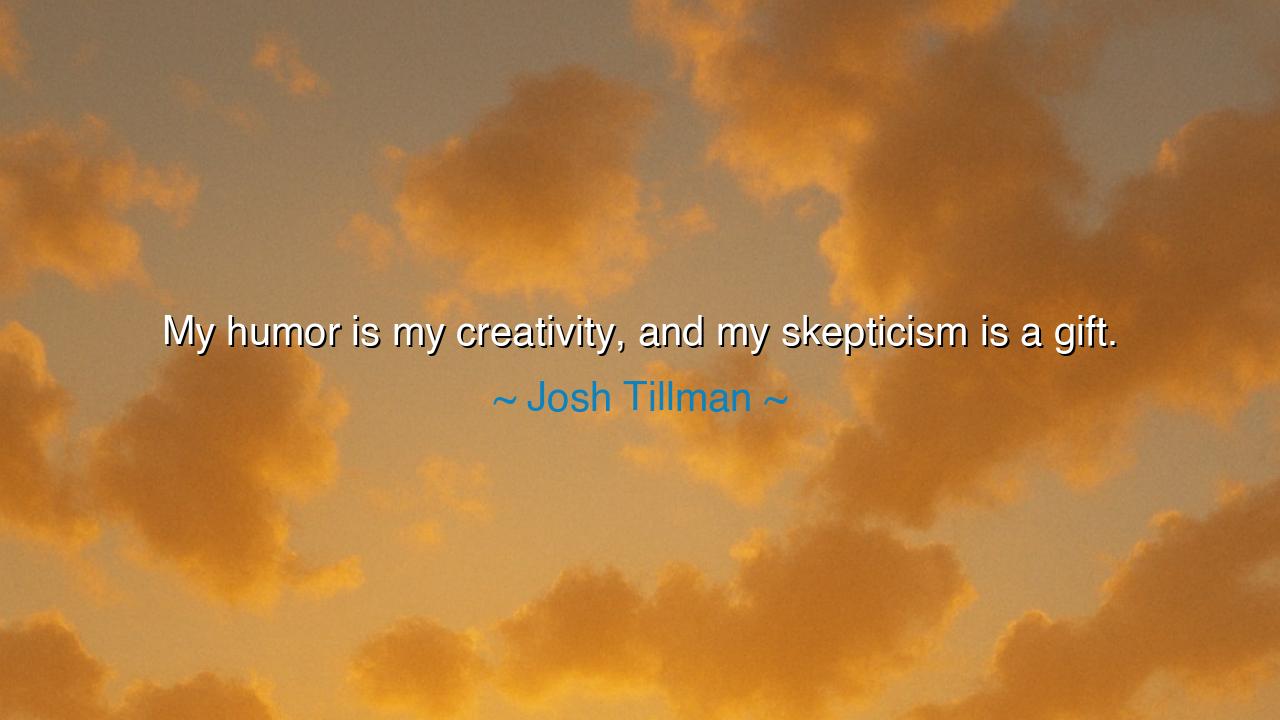
My humor is my creativity, and my skepticism is a gift.






In the words of Josh Tillman, “My humor is my creativity, and my skepticism is a gift.” These words, simple and serene on the surface, are in truth a song of duality — a testament to the strange marriage of laughter and doubt that gives birth to wisdom. Tillman, known to many as Father John Misty, speaks as the ancients once did: through paradox. For he tells us that both humor and skepticism, often misunderstood as lightness and distrust, are in fact sacred powers — two instruments that shape the soul’s music, the one through joy, the other through questioning. Together they guard the spirit from blindness and despair, allowing a man to see the world not as it is told to him, but as it truly is.
To call humor an act of creativity is to recognize it as divine imagination made flesh. Humor, at its highest, is not mere jest but insight wrapped in laughter. It is the spark that leaps between contradictions, the alchemy that transforms sorrow into meaning. When the world grows heavy with falsehood or grief, humor lifts the veil and reveals truth in absurdity. The ancients called this the wisdom of the trickster — the sacred fool who mocks kings not to belittle them, but to awaken them. So too does the artist, with his laughter, remind humanity that life’s deepest lessons are often hidden beneath irony. Tillman’s humor, biting and surreal, springs from that same well: a refusal to take illusion too seriously, and a refusal to let despair have the final word.
But the second half of his confession — “my skepticism is a gift” — is the counterweight, the shadow to humor’s flame. For skepticism is not cynicism, nor the coldness of disbelief; it is the discipline of the seeking mind, the refusal to accept the world’s easy answers. It is the art of discernment — to question not because one doubts truth, but because one reveres it too deeply to take it lightly. The ancient philosopher Socrates built his life upon such skepticism. He questioned all — priests, poets, politicians — not to destroy belief, but to purify it. His unyielding search for truth led him to drink hemlock with serenity, for he knew that a life without inquiry is a life unlived. Thus, skepticism, rightly held, is not the enemy of faith, but its companion — a light that burns away false certainty, leaving only the gold of genuine understanding.
And when humor and skepticism dwell together, they create the soul of the artist — the one who can laugh at the world’s pretenses yet still seek its beauty. This union of opposites grants vision: the laughter of the heart keeps the mind from bitterness, while the doubt of the intellect keeps the laughter from becoming shallow. History offers us many such souls — one among them, Mark Twain, who clothed his skepticism in humor, using wit as his blade and laughter as his shield. His jokes stripped away the hypocrisy of his age, yet behind every jest lay compassion — a longing for mankind to wake up and be kinder, wiser, freer. He, like Tillman, understood that the truest humor is born not from cruelty, but from clarity.
To those who listen, Tillman’s words carry a challenge: to embrace both the fool and the philosopher within. In a time when the world is loud with false truths and hollow laughter, he calls us to refine both our wit and our doubt. Humor without skepticism becomes frivolity — a mask for fear. Skepticism without humor becomes bitterness — a prison for the soul. But together, they create balance: a way to live joyfully while thinking deeply, to question fiercely while remaining light. This is the path of the wise, the artist, the awakened one.
Consider then your own life. When darkness presses near, let humor be your fire — laugh not to escape pain, but to see through it. And when the world demands your unquestioning faith, let skepticism be your sword — question not to destroy, but to refine what is real. As the mystics once said, “Faith without doubt is dead; joy without thought is folly.” To live rightly is to hold both — the laughter that heals and the doubt that sharpens.
Let this, then, be your lesson: Honor your humor, and honor your skepticism. Do not silence either. Create with laughter, and think with humility. Use your humor to speak truth without cruelty, and your skepticism to pursue wisdom without pride. For these two — the jester and the seeker — are the twin guardians of the soul. They will keep your heart awake when others sleep, and your spirit humble when others grow proud.
And so, dear listener, remember Tillman’s quiet truth: “My humor is my creativity, and my skepticism is a gift.” May your laughter build bridges where others see walls, and may your doubt light the way where others walk in darkness. For the world belongs not to those who know everything, but to those who can laugh, question, and still believe — bravely, humbly, and endlessly.






AAdministratorAdministrator
Welcome, honored guests. Please leave a comment, we will respond soon